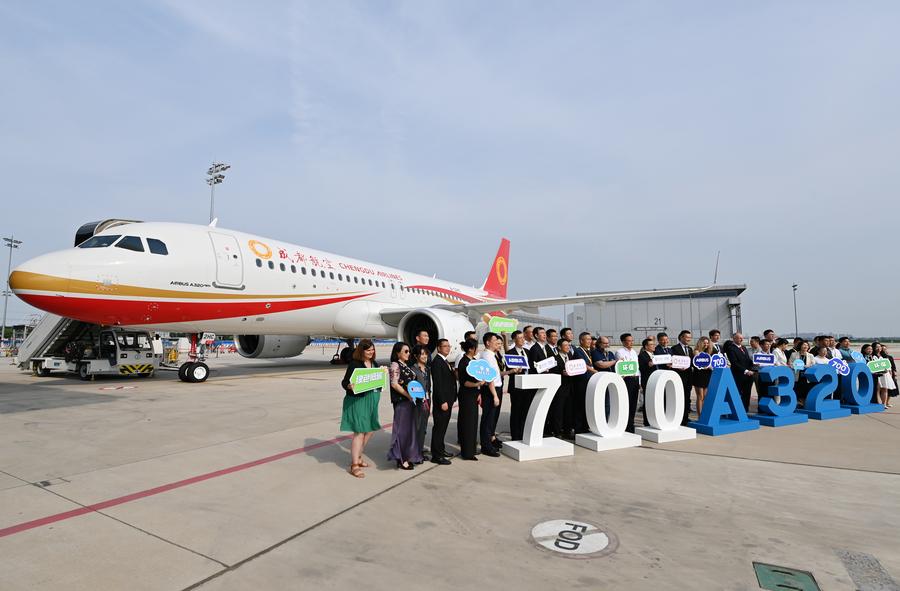Airbus to celebrate 40 years of success in China's skies

Guests attending the delivery ceremony of the 700th A320 family aircraft assembled by Airbus Tianjin to Chengdu Airlines pose for a group photo in front of the A320neo aircraft in Tianjin, north China, July 8, 2024. (Xinhua/Li Ran)
TIANJIN, Dec. 27 (Xinhua) -- Amid the roar of machinery and flying sparks, work is progressing at full speed at the massive construction site for the second Airbus A320 Family Final Assembly Line (FAL) project in north China's Tianjin Municipality.
The construction of the workshop, hangar hall and other supporting buildings, covering a total floor area of over 128,000 square meters, is scheduled for completion in the third quarter of 2025. This coincides with the 40th anniversary of Airbus aircraft's entry into the Chinese market.
The second FAL project, which aims to further expand the assembly capacity for the A320 family in China, was born out of Airbus' deepening investment in China, the largest single-country market for the European aircraft manufacturer.
In April 2023, the Tianjin municipal government, the Aviation Industry Corporation of China (AVIC) and Airbus clinched a framework agreement for the second FAL project. Just months later, the groundbreaking ceremony for the plant took place.
"The Tianjin FAL is key to Airbus' global industrial strategy," said Juan Tubio, general manager of Airbus (Tianjin) Final Assembly Co., Ltd. "The stable and reliable assembly line, high-quality surrounding infrastructure, and resilient supply chain have left us feeling very satisfied with the ecosystem here, as well as our Chinese partners and suppliers."
Since its launch in 2008, the Tianjin FAL has produced about one-third of the more than 2,000 Airbus aircraft currently in service in China's fleet, and has also delivered planes to customers in Europe, Asia and the Middle East.
AIRBUS' 2024 IN CHINA
The year 2024 has seen Airbus continue to expand its presence in China.
In January, Airbus unveiled its first global aircraft recycling project in Chengdu, a major aviation hub in southwest China.
"Here, 75 percent of the stored aircraft will be upgraded before flying again, and the rest of the planes, after being taken apart, can be recycled to the extent that over 90 percent of their weight can be reused, effectively giving them a new lease of life," said George Xu, Airbus executive vice president and Airbus China CEO.
In July, Airbus delivered its 700th A320 family aircraft assembled at the FAL in Tianjin, underscoring the company's "strong commitment" to China, its aviation market and continuous development in the region, noted Christoph Schrempp, general manager of the Airbus Tianjin Delivery Center.
In November, Airbus expanded its collaboration with AVIC Xi'an Aircraft Industry Group. Shortly after, in December, it opened its first safety promotion center in China in Tianjin, as part of the company's global initiative to strengthen safety culture within the organization and enhance safety awareness across the industry.
ROARING WITH CHINA'S GROWTH
Since China introduced its first Airbus aircraft in 1985, the country has provided not only a vast market but also a stable and reliable supply chain. Meanwhile, Airbus has led many international suppliers to establish operations in China, helping to supply the global market from there.
As of October 2024, Airbus Tianjin had delivered over 750 A320 Family aircraft, 16 A330 aircraft and 24 A350 aircraft since 2008.
Airbus's 40-year journey in China has coincided with the dynamic growth of the country's civil aviation sector, which has been buoyed by the robust demands amid the country's rise to the world's second-largest economy.
In 1978, during the early stages of China's reform and opening up, the country's total air transport volume constituted a mere 0.26 percent of the global share. By 2005, this number had climbed significantly to 5.3 percent. Today, China's civil aviation industry has been the world's second-largest for 19 consecutive years, contributing over one-fifth of the global air transport growth. As of October 2024, China had 262 airports in operation, boasting a fleet of 4,365 aircraft.
According to Airbus' market forecast, China will require more than 9,500 new passenger and cargo aircraft over the next two decades, driven by robust air travel and freight demand growth.
Airbus CEO Guillaume Faury has underscored the company's steadfast confidence in the Chinese market.
"Airbus values its longstanding partnership with the Chinese aviation industry, which goes beyond the sale of aircraft and solutions," Faury said, adding that Airbus' footprint in China includes an engineering center in Beijing, an innovation center in Shenzhen, an R&D center in Suzhou, the A320 final assembly line and wide-body completion center in Tianjin, as well as an aircraft lifecycle service center in Chengdu.
The second FAL project under construction will theoretically double Airbus Tianjin's production capacity, while increasing the "Chinese elements" in Airbus aircraft, according to Xu.
"This means that Airbus' A320 family production capacity in China will account for 20 percent of the total global production capacity," Xu said.


